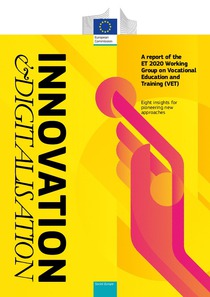Innovation & digitalisation. A report from the ET 2020 working group on vocational education and training (VET) : eight insights for pioneering new approaches

Publications Office of the European Union - Luxembourg
2020
194 p.
digitalisation ; innovation ; vocational training ; EU policy ; level of qualification ; training policy ; artificial intelligence
Education and training
English
Bibliogr.;Charts;Statistics
"There is great potential for innovation and digitalisation to boost high quality VET and higher VET. In turn, this could enhance the employability and personal development of young learners and people of working age, ultimately contributing to tackling the major environmental, social and economic challenges of our time. Despite this promise, the potential of innovation and digitalisation in VET has yet to be fully exploited. Whilst higher education has traditionally been viewed as absorbing and stimulating innovation, the contribution of VET is often understated or unexplored. Meanwhile, climate change, the threat to biodiversity, the rapidly changing world of work, job polarisation, and new technological and digital developments (e.g. industry 4.0, robotisation, artificial intelligence) mean that digital and green skills are now key to navigating a fast-growing and changing world. In particular, people of working age, regardless of their level of education or qualification, need to obtain an initial qualification and continuously update their skills or reskill to enter, re-enter or remain in the labour market. Against this background, VET systems need to reflect and integrate these changes and redefine their role to support innovative processes and products"
Digital
ISBN (PDF) : 978-92-76-20936-2
The ETUI is co-funded by the European Union. Views and opinions expressed are however those of the author(s) only and do not necessarily reflect those of the European Union or the ETUI.